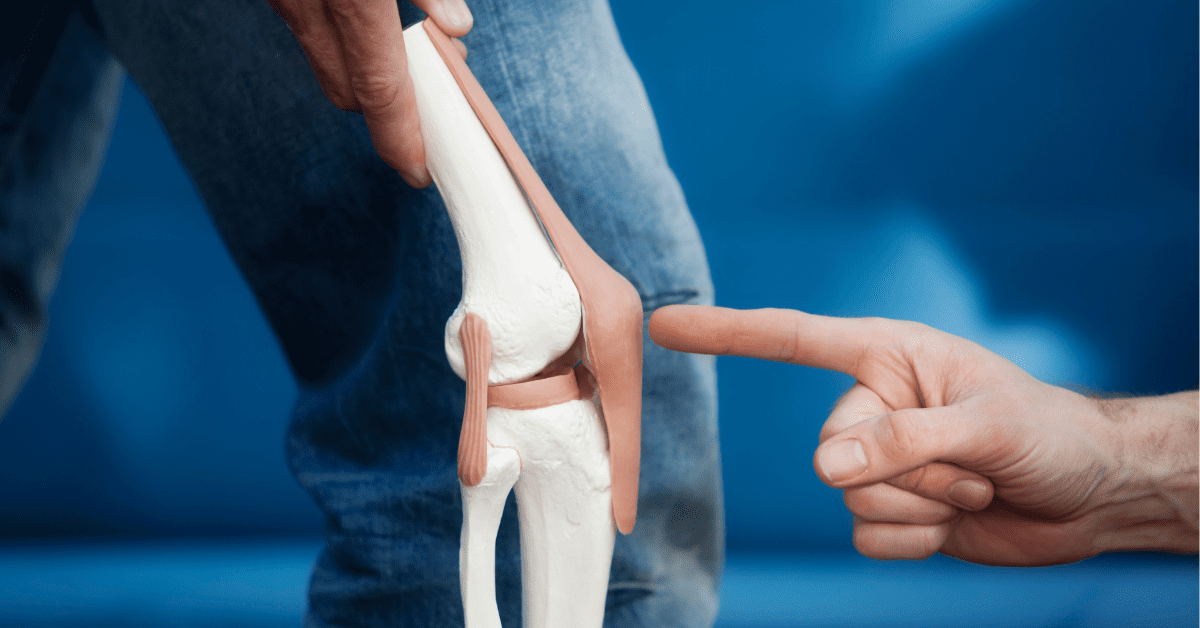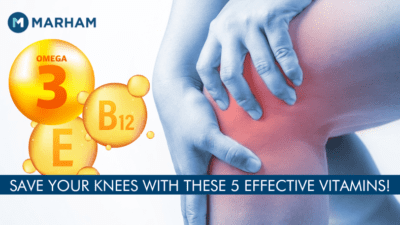Cracking knees or joints can indicate a vitamin deficiency which can lead to disease if not treated at the right time. There are several vitamins for cracking knees on the market. But, which ones are the most effective?
Check out some of the best vitamins for cracking knees in this health blog and also the potential causes behind them.
About Cracking Knees:
The cracking or popping of the knees is also known as knee crepitus. “Knee crepitus is extremely common with 99% of knees making some sort of physiological noise,” says research.
Internally, the knee joint is coated by cartilage, which is the same coating that you can find on a chicken bone. This cartilage protects the joint when we flex, bend, and straighten our knees.
When this cartilage wears or frays, the typical smooth sensation that occurs with bending the knee might become rough, resulting in cracking noises. If the cartilage is significantly injured, extreme painful catches and edema can follow.
What are the Causes of Cracking Knees?
Not many studies have been done on knee cracking, although a recent study has revealed that the vast majority of knee sounds are natural rather than harmful.


Your knees might be making cracking noises due to the following reasons:
Damage to Knee Ligaments
Trauma can result in knee ligament injuries like Sports injuries. The anterior cruciate ligament (ACL) is one of the most often damaged ligaments.
A loud popping sound, generally accompanied by acute pain, is one of the defining indications of an anterior cruciate ligament (ACL) injury in the knee.
Bubbles of gas
Having gas bubbles in the knees can also be a reason for cracking or popping noises. It is usually not a cause for concern.
Over time, gas can collect in the tissues surrounding the joint, causing tiny bubbles in the synovial fluid. As you bend your knee, some of the bubbles pop.
Arthritis
Osteoarthritis, often known as “wear and tear” arthritis, usually affects the joints you use the most and those that bear weight, such as the knees.
Mechanical stress and metabolic changes combine in osteoarthritis to tear down the cartilage that cushions the joint over time. This produces inflammation and discomfort, as well as crackling and crunching in the joint.
Also, read does Flaxseed Oil Help in Joint Pain
Injuries
Cracking of the knees can also be caused by an injury. If you fall on your knee, you may injure the kneecap or other portions of the knee joint.
Some common types of injuries that can cause cracking noises in the knees are:
- Meniscus tears
- Chondromalacia patella
- Patellofemoral syndrome
If you have had a knee injury recently and your joints are making cracking or popping noises, it is highly recommended to get it checked. Click here to see an online Knee Specialist today via the Marham app.
Best Vitamins for Cracking Knees:
Some of the best vitamins for cracking knees include the following:
1. Omega-3 Fatty Acids
Omega-3 fatty acids are anti-inflammatory and are commonly used in joint supplements to promote healthy joints, especially the knees, and even for the treatment of arthritis.
Alpha-linolenic acid (ALA), docosahexaenoic acid (DHA), and eicosapentaenoic acid (EPA) are the three omega-3 fatty acids (EPA). Research suggests that they can treat knee problems effectively.
“Omega-3 EFA fish oil supplements appear to be a safer option to NSAIDs for the treatment of nonsurgical neck or back pain,” says a 2006 study on Omega-3 fatty acids.
2. Vitamin E
Data supports that vitamin E supplementation has a preventive function against oxidative stress-mediated biomolecular degradation in osteoarthritis.
The most frequent arthritic ailment and the primary cause of persistent impairment in the elderly is osteoarthritis. Vitamin E has been demonstrated to lessen pain and inflammation related to arthritis because it is an antioxidant.
3. Curcumin
Turmeric is a common spice used in Pakistan for cooking. It is a functional food because it contains the chemical component curcumin. According to research, Curcumin contains anti-inflammatory effects and appears to successfully alleviate the symptoms of knee arthritis.
Because curcumin only contributes to roughly 3% to 5% of turmeric, taking a supplement may be the best approach to get the anti-inflammatory effects of this chemical.
4. Glucosamine
Glucosamine is in charge of the cartilage in the joints, which is the primary building component. In other words, it will strengthen the joints and increase joint mobility.
It is necessary for the formation, repair, and general health of the connective tissues found in joints. So, glucosamine supplements might be some of the best vitamins for cracking knees.
5. Vitamin B12
Low vitamin B12 levels can resemble arthritic symptoms such as weariness and discomfort or tingling in the limbs. It is also involved in the regulation of homocysteine levels, which have been reported to be high in rheumatoid arthritis patients.
According to 2019 research, Vitamin B12 might be used as an additional or complementary therapy for pain.
Consult an Orthopedic Doctor for Cracking Knees!
Cracking knees and joints can be a sign of some harmful diseases that can get worse without proper treatment. Supplements can be helpful but they should only be taken after consulting with a doctor.
An Orthopedic doctor is a specialist that treats all issues related to the bones. They can help you find the best treatment and suggest effective vitamins for craking knees.
Can’t Find the App?
| Android | IOS |
|---|---|
  |
  |
FAQs
How do I stop my knees from cracking?
Physiotherapy is the best way to stop your knees from cracking. However, you also can try stretching, omega 3 supplements, foam rolling, deep squat stretch, and knee gapping stretch.
Is cracking knees a sign of arthritis?
If your knees crack only on certain occasions e.g. after lifting something heavy it may not be a sign of something harmful. However, if the noise is frequent and severe, it might be an indication of osteoarthritis, rheumatoid arthritis, or patellar dysfunction.
How do you treat cracking knees naturally?
Many reasons for joint popping and cracking can be alleviated with home treatments such as anti-inflammatory medicines or the RICE approach (rest, ice, compression, and elevation). But, you may require the help of a doctor at times.

